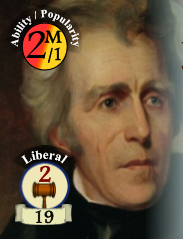
George Washington |

Andrew Jackson |

Abraham Lincoln |
This approach is a direction different from man as solving a problem – in game terminology, resolving an issue – provides Popularity in terms of the results the politicians had to contend with in their own time.
Today many consider the Mexican-American War an aggressive, unnecessary war that caused loss of life and stole land from a neighboring nation. But in the game, the warlike response to this issue is the one that generates the most points. On the flipside, most today agree that slavery is entirely wrong. There is an issue that permits a president in the first administration to try (at considerable difficulty) to end it, But doing so does not generate much in the way of points. Considering later events such as the Bleeding Kansas, the Civil War and decade of civil rights battles, in retrospect we see this as a great feat to have performed. But as this would not have been the understanding at the time, doing so does not generate very many points.
Many designs award points in terms of the way we see things today. However, if the design did this it would force players to project today's concepts and values back into the past. This would not only be artificial, but would result in the available player choices diverging sharply from those contemporaries actually faced. The design is a role-playing game, almost,in that it tries to present a world as its participants actually saw it, at least as far as their political lives are concerned.
This does not mean that players cannot themselves choose to project their values back into the game. The character and issue cards present a great deal of flavor text in hope of prompting further background reading as well. By learning this information, players can glean something about the kinds of real life consequences that their decisions encompass. They can choose not to start an unnecessary war, not cruelly put down slave revolts or even try to end slavery much earlier than it actually was. What do they get for this? Only that which they would have received in real life, which often would be nothing, or even disdain and loss of power. We have seen, for example, in an earlier vignette how James Madison could have avoided war with the British in 1812, but might well not have been re-elected as a consequence.
Ultimately, the design asks you to reflect on who you are. Are you willing, for example, to condemn thousands to their deaths and spend millions in precious public treasure so that you can be seen by your contemporaries as a winner? Or is all that fine and after all, it's all just a game.
At the same time, in terms of legacy Popularity is not a terrible indicator. Cases like Washington and Lincoln are obvious, but interestingly even cases like Andrew Jackson and James Polk who were popular in their day still resonate today. The latter has tended to do well in many presidential polls while I have heard of Jackson fans who in their games take care to admit Tennessee so that Jackson can enter the game, and then presumably contend to be the one who plays him.
Created: 26 February 2019

